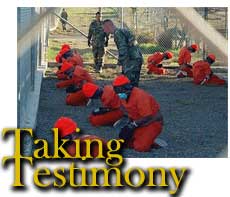
Peggy Gish, logging the cases of detainees
LTC Barry Johnson
Detainee Operations, Multi-National Force, Iraq
We heard the same kind of details over and over from all around the country.
We talked to the US military about those house raids, and though they denied the soldiers would take money or gold, they did not deny that they would go in with 25 seconds of absolute fury and try to bring the people into submission very quickly.
Then we began to hear stories of a very violent interrogation process. Men would report being kept in very painful positions for hours at a time, being deprived of sleep and water and food, some kept out in the hot summer sun for hours.
IRAQ PRISONERS – 6,700 security detainees held by multinational forces in Iraq (Source: MNF) – 10 major detention facilities in Iraq (source: Human Rights Watch, May 2004) – Most detainees held in Abu Ghraib prison in Baghdad and Camp Bucca in Um Qasr (source: Coalition Provisional Authority document obtained by CPT in May 2004) – Many detainees first held in temporary facilities for initial or secondary interrogation (source: HRW) – Iraqi families also believe some detainees held outside Iraq in facilities in Qatar, Kuwait and Germany (source: CPT) |
We also heard about sexual abuse and beatings when they were being questioned. If they did not give information about an explosion or something they would be knocked down, kicked in the groin, and hurt in other ways.
These men were held in Abu Ghraib and in prisons across the country. We think it is better since the Abu Ghraib scandal – we are not hearing the stories of overt sexual abuse – but people are still being humiliated and there is still a lot of physical brutality.
Many men are held because they happened to be on the street, even blocks away, from an explosion. The US military would round up hundreds of men in the area to try to find the few that caused the blast.
In fact, we came to the conclusion that 80% to 90% of the prisoners had never been involved in any violent action. This is an estimate that tallies with the estimates of other groups such as Amnesty International and Human Rights Watch.
A common reason for men to be detained is because an informant in the neighbourhood has given their name to US military and claimed that they are part of the resistance.
Informants get money for each name they give, and many people have told us that informants use the system to revenge personal grudges.
They say it is rather like life under Saddam Hussein. Many Iraqis use an Arabic expression, “Same donkey, different saddle”.
Back in December 2003, when we completed our first report, we sent copies to the US civilian and military authorities in Iraq.
We were received well, and we believe our reports helped make it difficult to cover up the abuses. But we are frustrated that [reforms to detention techniques] have not gone any further despite the outrage.
CPT COMPLAINTS – Abuse reported by detainees at Abu Ghraib, Camp Bucca and Baghdad International Airport (BIAP) detention facility, and initial intake facilities – Improvements since April 2004 but reports of abuse continue – Only a small proportion of detainees face criminal charges; remainder are in legal limbo – Difficult to find information on detainees or arrange visits, though situation improved – Final fate of detainees still in hands of Multinational Forces – Property taken in house raids not returned and no receipt given – Detainees report overcrowding, lack of medical facilities, poor food and water in detention facilities, but improvements reported |
In general, since Saddam Hussein was overthrown, people do have more freedom of speech, more freedom of movement, and wages are a little higher, so there are some positives.
But in many ways things have got worse – there is less electricity and water, unemployment is at 50% or 60%, there is much more danger. People are feeling very discouraged and fearful.
And in fact, people feel like it is less safe where there are multinational troops, because of the combat. In fact, the last time I was there I started hearing people say the primary source of the violence was the US presence.
People were saying: “We think the US needs to leave right away, even if there is a civil war or a power grab – it couldn’t be much worse than it is now. At least we will be able to handle the situation ourselves.”
There are still a few people that want the US to stay, but they’re a very small minority now.
ATTENTION READERS
We See The World From All Sides and Want YOU To Be Fully InformedIn fact, intentional disinformation is a disgraceful scourge in media today. So to assuage any possible errant incorrect information posted herein, we strongly encourage you to seek corroboration from other non-VT sources before forming an educated opinion.
About VT - Policies & Disclosures - Comment Policy



